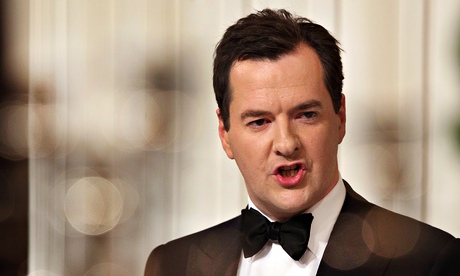
George Osborne will use his Mansion House speech on Thursday to give City regulators the power to cap risky mortgage loans in a bid to allay fears of a growing housing bubble.
In a dramatic move, the chancellor plans to allow the Bank of England to limit loans that could undermine the financial stability of the UK housing market.
In a bid to show he is taking action to boost the supply of homes, Osborne will also say he is making changes to the planning regime that could see a further 200,000 homes built.
The new rules will allow the Bank of England to set a maximum multiple of income that homebuyers can borrow and prevent mortgage lenders from offering first-time buyers high loan-to-value mortgages.
Osborne has come under intense pressure to take the heat out of the housing market over recent months as figures showed average prices rising by more than 10% over the last year and by more than 16% in London and the south-east.
City regulators have already strengthened mortgage lending rules with stricter affordability tests and restricted a government-backed credit scheme aimed boosting lending to business customers only.
This latest move gives the central bank draconian powers to prevent excessive lending and is likely to be seen in the City as a return to more draconian 1970s-style credit controls.
It may also be taken as a further sign that the government is expecting interest rates to rise this autumn, mostly as a way of cooling the housing market.
Initiatives to spur house building and match growing demand with an increase in the supply of homes have so far fallen flat. The mayor of London, Boris Johnson, was recently forced to admit he missed targets for housebuilding last year when only half the expected homes were completed.
Osborne will say that the housing market does not pose an immediate threat to financial stability, but that it will if prices continue to rise sharply.
He will say it is important to enhance the Bank's powers, which are currently restricted to making recommendations, to insure the UK against future problems before they can materialise.
Speaking ahead of his speech, Osborne said: "Our economic plan has brought stability and security and I'm not going to let anything undermine that. So I am acting against future risks in the housing market by today giving the Bank of England new powers to intervene and control the size of mortgages compared to family incomes and house values and I'm also taking new steps so we build many more homes in our towns and cities."
But Osborne will stop short of proposals outlined on radio this morning by the business secretary, Vince Cable, who suggested a mortgage cap set at 3.5 times a mortgage applicant's income.
Cable's radio appearance looked like a pre-emptive strike, designed to ensure that he retained ownership of the threat of house price inflation - a subject that he has repeatedly said could threaten a recovery.
Liberal Democrat sources have claimed Osborne has been resisting intervention advocated both by the Bank and the Liberal Democrats because he hopes rising asset prices will help generate a feelgood factor ahead of the 2015 election.
Conservative sources said the Cable plan was equivalent to the Treasury telling the Bank of England what interest rates it should set.
Osborne will also set out some measures to ensure more houses are built on brownfield sites, but it will be the promise to empower the Bank to cap mortgages that will capture most attention.
Latest data on lending shows that loan to value ratios remain well below the peak reached before the crash in 2007, but that loan to income ratios are at a new high. The chancellor will also admit there are signs that house price inflation is beginning to spread beyond the south-east.
The powers will require new legislation due to be in place by the end of the parliament and will take the form of further tools for the financial policy committee, the new independent body charged with macro-prudential oversight of the financial system.
Osborne will also defend the Help to Buy scheme, pointing out, as the IMF concluded last week, that it is helping lower income families, overwhelmingly first-time buyers outside London, to buy homes priced well below the national average.
Cable told BBC Radio 4's Today programme: "It is crucially important that the banks don't throw petrol on the fire, and traditionally most of us who have been through housing booms in the past have recognised that a stable level is about three, three and a half times people's income.
"This is the key area that the Bank of England has now got to operate in, to make sure that this boom in house prices in the south of England doesn't destabilise the whole economy."
Under the chancellor's plan to encourage housebuilding, councils will be required to put in place pre-approved planning permissions on brownfield sites that are suitable for housing. Local authorities will apply local development orders (LDOs) onto sites and the expectation is for over 90% of suitable brownfield land to be covered by 2020. This approach will allow developers to get building sooner, saving them time and money.
The Treasury will create a £5m fund to help local authorities create the first 100 sites with LDOs. Developers may also be given powers to apply directly to central government where councils have not done enough to remove planning obstacles on brownfield sites.

